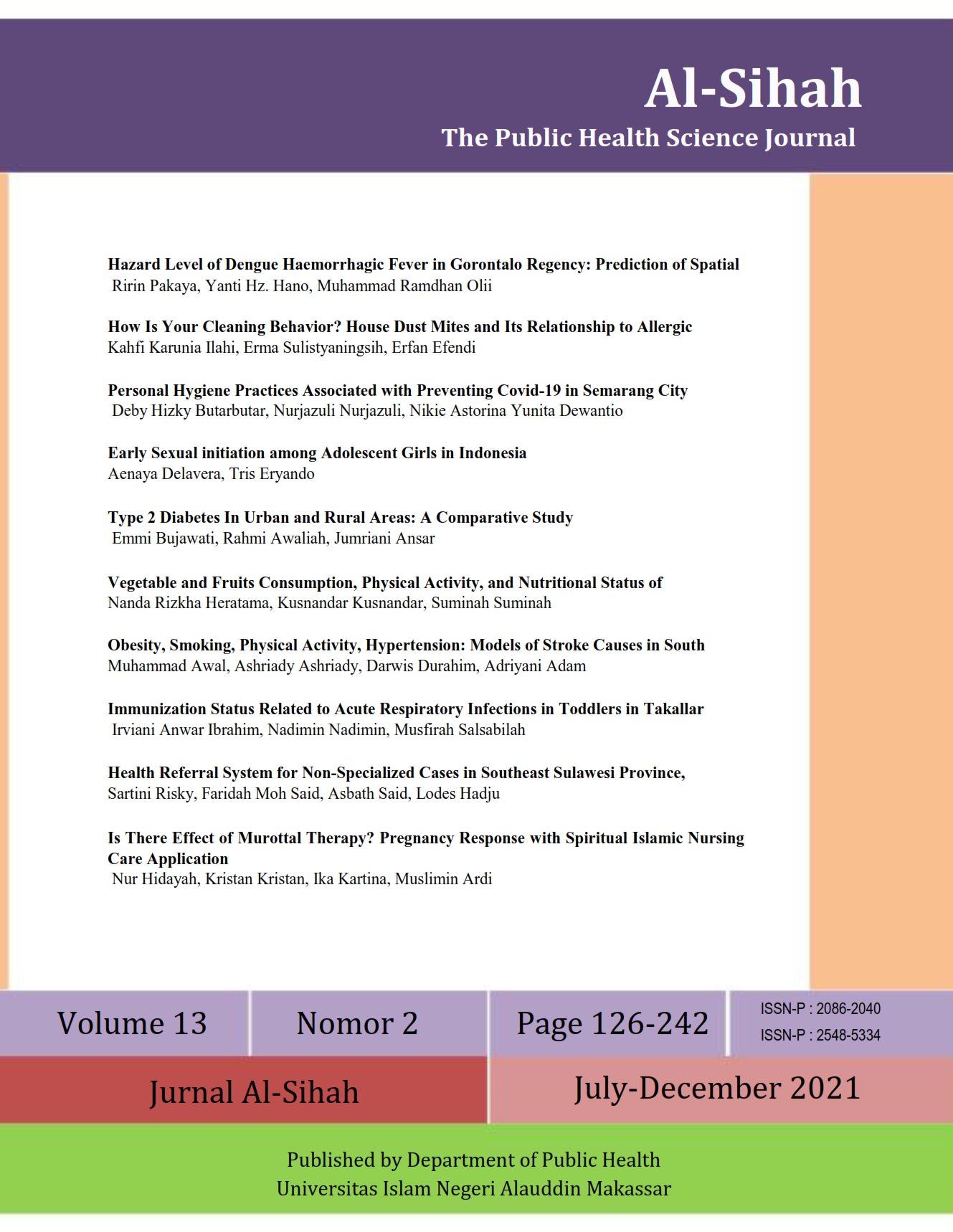Health Referral System for Non-Specialized Cases in Southeast Sulawesi Province, Indonesia
Abstract
The government prioritizes health as one of the areas in which it seeks to boost the country's growth, but the referral system in place has failed to deliver high-quality health care. The purpose of this study was to assess and empirically demonstrate the extent to which the health referral system has been implemented in Kendari Health Center and Bau-Bau City. The study was held in the Kendari City Health Center and the Bau-Bau City Health Center, and it lasted from February 2020 to February 2021. This research method is a qualitative approach based on postpositivism's theory, in which the researcher is the primary instrument, triangulation is used to collect data, inductive data analysis is used to analyze data, and qualitative research results emphasize meaning rather than generalization. Informants in this study amounted to 15 informants. Qualitative data were analyzed using the NVIVO 12 QSR application. The research findings indicate that there is a conceptual link between the health system and the concept of implementing a referral system. This research emphasizes to the health service center the importance of increasing the knowledge of health workers through training for both doctors and advocacy for policymakers regarding the improvement of health facilities.
Downloads
References
Akbar, F. H., & Jaya, M. T. (2017). Relationship between service quality on public health center and patient satisfaction. Glob J Health Sci, 9(7), 96-102. https://doi.org/10.5539/gjhs.v9n7p96
Alawi, M., Junadi, P., & Latifah, S. N. (2017). Analisis Faktor-Faktor yang Berhubungan dengan Tingginya Rujukan Kasus Non Spesialistik Pasien Jaminan Kesehatan Nasional pada Puskesmas di Kabupaten Sukabumi Tahun 2015. Jurnal Ekonomi Kesehatan Indonesia, 2(1). http://dx.doi.org/10.7454/eki.v2i1.1954
Amini, A., Doshmangir, L., Adham, D., & Janati, A. (2017). Challenges Of Establishing Speciality Referral System In Iran’s Health Sector (A Qualitative Study). Acta Medica Mediterranea, (October). https://core.ac.uk/download/pdf/211573287.pdf
Anhar, Ahmad Loai, I. C. (2016). Studi Komparatif Pemanfaatan Pelayanan Kesehatan Pada Masyarakat Pedesaan Di Wilayah Kerja Puskesmas Poleang Barat Dengan Masyarakat Perkotaan Di Wilayah Kerja Puskesmas Lepo-Lepo Tahun 2015. Jurnal Ilmiah Mahasiswa Kesehatan, 1(2), 1–13. http://ojs.uho.ac.id/index.php/JIMKESMAS/article/view/654
Barghouthi, E. A. D., & Imam, A. (2018). Patient Satisfaction: Comparative Study between Joint Commission International Accredited and Non- accredited Palestinian Hospitals. https://dspace.alquds.edu/handle/20.500.12213/5047
BPJS Kesehatan Cabang Bau-Bau. (2019). Laporan BPJS Kesehatan Kota Bau-Bau Tahun 2018.
BPJS Kesehatan Cabang Kendari. (2019). Laporan BPJS Kesehatan Kota Kendari Tahun 2018.
Chabibah, N., & Chalidyanto, D. (2014). Analisis Rasio Rujukan Puskesmas Berdasarkan Kemampuan Pelayanan Puskesmas. Jurnal Administrasi Kesehatan Indonesia, 2(3). http://journal.unair.ac.id/download-fullpapers-jaki0a897b56aefull.pdf
Fitriyanah, E., & Utomo, T. P. (2017). Perbedaan Tingkat Kepuasan Pasien BPJS dan Pasien Umum tentang Mutu Pelayanan Keperawatan Unit Rawat Inap Kelas 3 RSUD Dr. H Soewondo Kendal. Jurnal Ilmu Keperawatan dan Kebidanan, 9(2). http://ejournal.stikestelogorejo.ac.id/index.php/jikk/article/view/600
Jandavath, R. K. N., & Byram, A. (2016). Healthcare service quality effect on patient satisfaction and behavioural intentions in corporate hospitals in India. International Journal of Pharmaceutical and Healthcare Marketing. 10(1), 48-74. https://doi.org/10.1108/IJPHM-07-2014-0043
Kaporina, A., Setyawan, M. H., & Novitasari, A. (2017). Gambaran Tingkat Kepuasan Pasien Terhadap Pelayanan Di Instalasi Rawat Inap Ruang B2 Tht & Kulit Kelamin Rsup Dr. Kariadi Semarang. Prosiding Seminar Nasional & Internasional. https://jurnal.unimus.ac.id/index.php/psn12012010/article/view/886
Kurniawati, M., Siswanto, S., & Ratri, D. R. (2021). Pengaruh Komunikasi Organisasi Terhadap Keluhan Pelanggan yang Dimediasi Pengetahuan Karyawan Tentang Pelayanan Pasien BPJS Ranap. CHMK HEALTH JOURNAL, 5(2), 279-289. http://cyber-chmk.net/ojs/index.php/kesehatan/article/view/983
Lail, N. H. (2019). Kualitas Pelayanan Bidan dan Keluhan Pasien Dengan Loyalitas Pasien Pasca Persalinan Peserta BPJS. Jurnal Ilmiah Kebidanan Indonesia, 9(01), 36-46. https://doi.org/10.33221/jiki.v9i01.213
Lesmana, T. C., & Norwakiah, N. (2021). Keluhan dengan Kepuasan Pasien Rawat Jalan Jaminan Kesehatan Nasional di Rumah Sakit Ludira Husada Tama. Jurnal Endurance: Kajian Ilmiah Problema Kesehatan, 6(1), 70-83. http://publikasi.lldikti10.id/index.php/endurance/article/view/141
Meesala, A., & Paul, J. (2018). Service quality, consumer satisfaction and loyalty in hospitals: Thinking for the future. Journal of Retailing and Consumer Services, 40, 261-269. https://doi.org/10.1016/j.jretconser.2016.10.011
Mohammadi-Sardo, M. R., & Salehi, S. (2019). Emergency department patient satisfaction assessment using modified servqual model; a cross-sectional study. Advanced journal of emergency medicine, 3(1). https://dx.doi.org/10.22114%2FAJEM.v0i0.107
Moorman, C., Zaltman, G., & Deshpande, R. (1992). Relationships Between Providers And Users Of Market Research: The Dynamics Of Trust Within And Between Organizations. Journal Of Marketing Research, 29(3), 314. https://doi.org/10.2307/3172742
Naseriasl, M., Janati, A., Amini, A., & Adham, D. (2018). Referral System In Rural Iran : Improvement Proposals. Cadernos De Saude Publica, 34(3). https://Doi.Org/10.1590/0102-311x00198516
Novitasari, D. E., Arso, S. P., & Fatmasari, E. Y. (2018). Analisis Pelaksanaan Penanganan Keluhan Pelanggan dan Pelayanan Informasi Di BPJS Kesehatan Kantor Cabang Semarang. Jurnal Kesehatan Masyarakat (Undip), 6(5), 39 - 51. https://ejournal3.undip.ac.id/index.php/jkm/article/view/21975
Prasetiawan, M. J., Mulyadi, E., & Aliftitah, S. (2019). Pemahaman Tentang Hak Dan Kewajiban Peserta BPJS Kesehatan Di Puskesmas Ganding Sumenep. Journal Of Health Science (Jurnal Ilmu Kesehatan), 4(2), 25-27. https://doi.org/10.24929/jik.v4i2.708
Ratnasari, D. (2017). Analisis Pelaksanaan Sistem Rujukan Berjenjang Bagi Peserta JKN di Puskesmas X Kota Surabaya. Jurnal Administrasi Kesehatan Indonesia, 5(2), 145-154. . http://dx.doi.org/10.20473/jaki.v5i2.2017.145-154
Sari, F. N., Zulfendri, & Sanusi, S. R. (2020). Referral demand of patients in Pantai Cermin public health center Langkat. Britain International of Humanities and Social Sciences (BIoHS) Journal, 2(1), 314-320. https://doi.org/10.33258/biohs.v2i1.194
Suryana, A. A. Y. (2020). Hubungan Pengetahuan Tentang Rujukan Dengan Pelayanan Rujukan Berjenjang Secara Online Pada Pasien Bpjs Kesehatan: Hubungan Pengetahuan Tentang Rujukan. Jurnal Ilmiah Wijaya, 12(2). https://jurnalwijaya.com/index.php/jurnal/article/view/108
World Health Organization (2008). Referral Systems - a summary of key processes to guide health services managers. https://www.who.int/management/Referralnotes.doc
Wulandari, R. D., Ridho, I. A., Supriyanto, S., Qomaruddin, M. B., Damayanti, N. A., Laksono, A. D., & Rassa, A. N. F. (2019). Pengaruh Pelaksanaan Akreditasi Puskesmas Terhadap Kepuasan Pasien. Media Kesehatan Masyarakat Indonesia, 15(3), 228–236. https://journal.unhas.ac.id/index.php/mkmi/article/view/6195
Yusuf, E., & Awwaliyah, I. (2018). The Implementation of Indonesian National Health Insurance Programme: How Satisfiedwerethe Insured Participants and the Healthcare Providers?. Journal of Consumer Sciences, 3(2), 27-42. https://doi.org/10.29244/jcs.3.2.27-42
Zulhadi, Trisnantoro, L., & Zaenab, S. N. (2013). Problem Dan Tantangan Puskesmas Dan Rumah Sakit Umum Daerah Dalam Mendukung Sistem Rujukan Maternal Di Kabupaten Karimun Provinsi Kepri Tahun 2012. Jurnal Kebijakan Kesehatan Indonesia: JKKI, 2(4).189–201. https://journal.ugm.ac.id/jkki/article/view/3203
Copyright (c) 2021 Sartini Risky, Faridah M. Said, Asbath Said, Lodes Hadju

This work is licensed under a Creative Commons Attribution-NonCommercial-ShareAlike 4.0 International License.
Authors retain copyright and grant the journal right of first publication with the work simultaneously licensed under a Creative Commons Attribution-NonCommercial-ShareAlike 4.0 International License that allows others to share the work with an acknowledgment of the work's authorship and initial publication in this journal.
Authors are able to enter into separate, additional contractual arrangements for the non-exclusive distribution of the journal's published version of the work (e.g., post it to an institutional repository or publish it in a book), with an acknowledgment of its initial publication in this journal.
Authors are permitted to publish their work online in third parties as it can lead to wider dissemination of the work.







